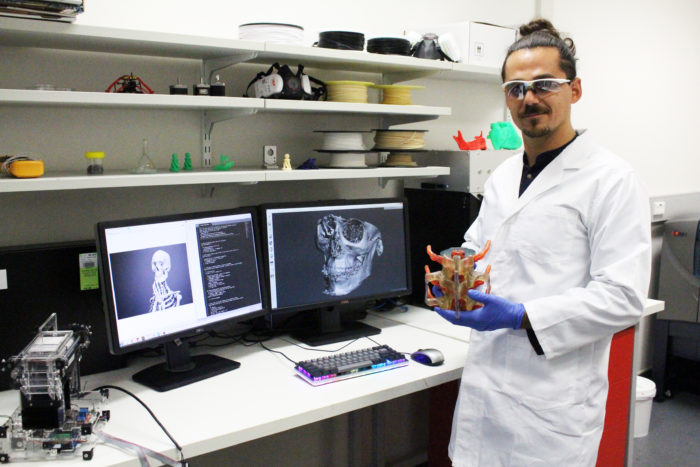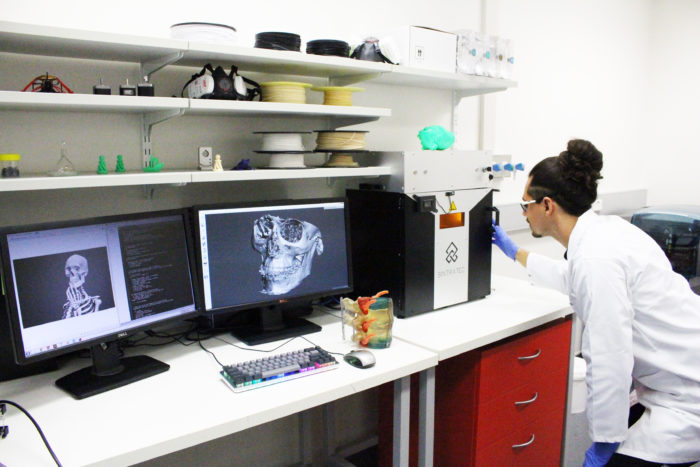News
3D printing bone tissue
Jun 28 2022
Many PhD students travel from far and wide to study at ACES, coming from all over the world to plunge into the world of materials sciences. But not ACES affiliate and University of Wollongong (UOW) Biofabrication PhD student Jeremy Dinoro.

Jeremy was born and raised on the south coast of the Illawarra – the home of ACES headquarters – and is a UOW masters graduate undertaking his PhD with the ARC Training Centre in Additive Biomanufacturing. Now that he’s moved on to his next research chapter, we sat down with him to talk about his project, what a day of work involves, living in Wollongong and much more, including his fascination with electronic devices.
You’re currently studying a PhD in biofabrication. What’s your specific focus for this project?
My project is focussed on developing a new 3D printing technique to produce patient-specific bone implants (a quick rundown can be found here). It involves interdisciplinary research as part of the ARC Industrial Transformation Training Centre in Additive Biomanufacturing and a Melbourne-based medical devices company called Anatomics, who have pioneered 3D printed implants for decades. Specifically, my project looks into tailoring implants to specific locations in the body and to promote bone growth and vascularisation.
Who are your supervisors for this PhD and are you working closely with any other students?
My academic supervisors are Prof Gordon Wallace, Dr Zhilian Yue and Dr Stephen Beirne. I also have regular meetings with Dr Phillip Lewis, head of research and development at Anatomics. My project was actually started by a Biofabrication master’s student, Kuan, who ironed out some initial issues in the printing process so I could ask more questions. I’m also collaborating with a PhD student from QUT Naomi, who, like me, started her research career in pursuing a Biofabrication Master’s degree.
What was your background before embarking on a PhD? I believe you studied both your undergraduate degree and masters here at the University of Wollongong?
Prior to starting my PhD I studied a Bachelor of Science with a major in Medical Biotechnology here at the University of Wollongong, following which I was accepted into the International Double Biofabrication Master’s degree starting with one year of research at UOW and moving to Utrecht University in the Netherlands for the second year.
How was that experience and how did it differ from studying in Australia?
My experience in Utrecht was invaluable. I learnt a lot about myself along with the Dutch and European way of life. I made life long friends and was able to explore many different countries and cultures. The day-to-day life over there is different to Australia – this also translates into the workplace. If I need to finish an experiment in Australia I will often stay past 5pm or even work on the weekends, with the necessary safety precautions, but over there the majority of work was completed between 8am and 5pm and we weren’t expected to stay late or continue working throughout the weekend.
A lot of postgraduate students at ACES have come here from abroad, but you’re originally from Wollongong. Why do you think it’s such an appealing place to come to for study?
Just simply looking at the location of Wollongong’s Innovation Campus on Google Maps is indicative of why it’s appealing, as the crow flies it’s less than 300 meters from the beach. The main campus is no slouch either. It’s nestled amongst the Illawarra escarpment or ‘the nature’ as some European people would say.

What do you like most about living and studying in Wollongong?
Honestly, it’s ‘the nature’, and once you’ve had the convenience of pristine coastline access it’s hard to move. It’s something I missed regularly whilst living in the Netherlands.
I’m sure every day is different for you, but what does a normal day usually involve?
Typically, my day starts off with checking the waves, and if there’s none I’ll do some yoga and walk into the lab. From there I’ll respond to any emails and check for any new relevant publications. As my PhD is an experimental one, I spend most of my time planning and investigating new ways to 3D print patient-specific implants. These range from chemical and mechanical analysis as well as testing their biological performance. So, I’m usually between a few labs.
What do you hope ultimately comes out of your research?
It’s hard not to make this sound cliché, but what initially attracted me to the idea of medical research was that fact that I could help people. I feel I have the opportunity to take advantage of the tools and researchers within ACES to ultimately benefit the lives of those within the community, and contribute to the future of the medical industry throughout the ongoing development of 3D printed custom implants.
You’re set to finish you0r PhD next year? Do you have any plans for what’s next?
This industry-based PhD has required me to think beyond my research and towards understanding the processes involved in medical device regulation, both within Australia and internationally. I think that this, in itself, has opened my eyes to the fact that some of these research ideals can have real-world applications. Academia isn’t so bad but I do like the idea of a tech start-up aimed at producing custom prosthetics for animals, so if anyone reading this has experience with this or wants to start a business, you can always contact me on Twitter!
What’s your favourite aspect of what you do and what do you most like about being part of ACES?
Another cliché but it purely comes down to curiosity, advancing human knowledge in all disciplines so humanity can progress. Research focuses on the premise of new and innovative ideas. I like developing experiments to test these ideas, whether they work or not is a different question! [Laughs]
Being part of ACES gives me access to a variety of disciplines. The disciplines I used to think weren’t relevant to my research are now becoming relevant. I never thought I would have to solve physics, engineering and ethical dilemmas after studying biology and chemistry. ACES gives me access to world-class additive manufacturing (or 3D printing) engineers as well as physicists and social scientists, all of which are invaluable assets if I want to progress my research.
If you weren’t studying a PhD in biofabrication, what do you think you would be doing with yourself?
I’d still be surfing. That’s for sure!
Interesting question actually… I’ve never thought about it. I guess I can’t see myself doing something outside disciplines beyond technology or medical research. I’m fascinated by the progress of electronic devices we use regularly, so I’d definitely be involved in a tech start-up with ambitions to revolutionise healthcare.
Thanks, Jeremy.













